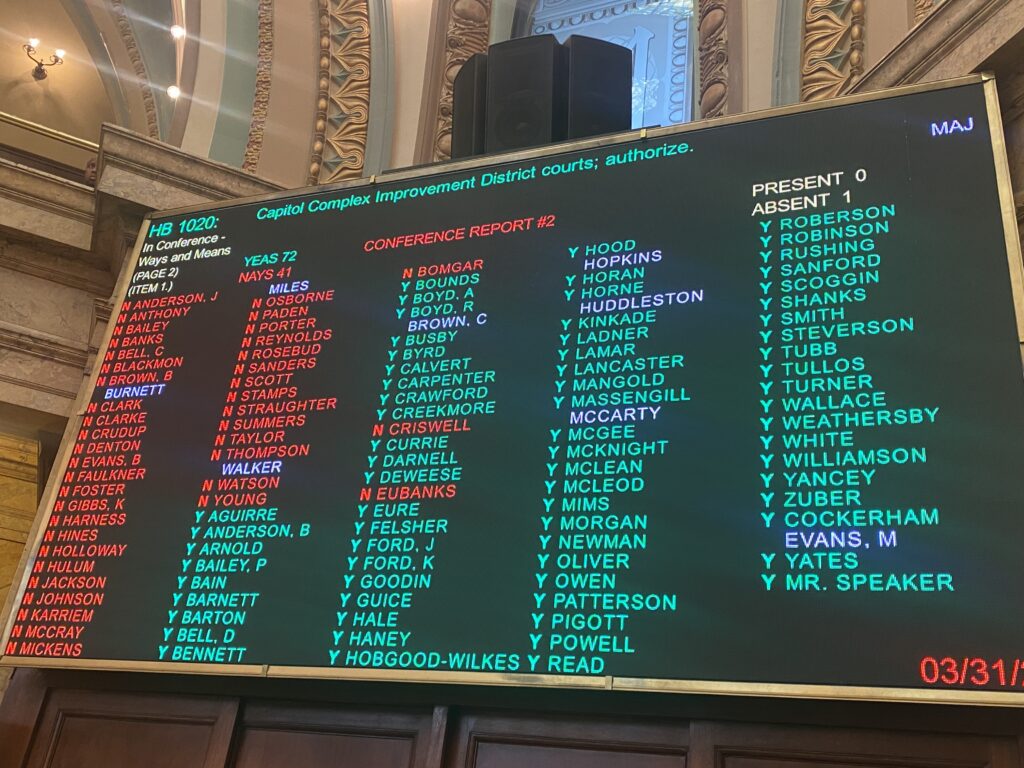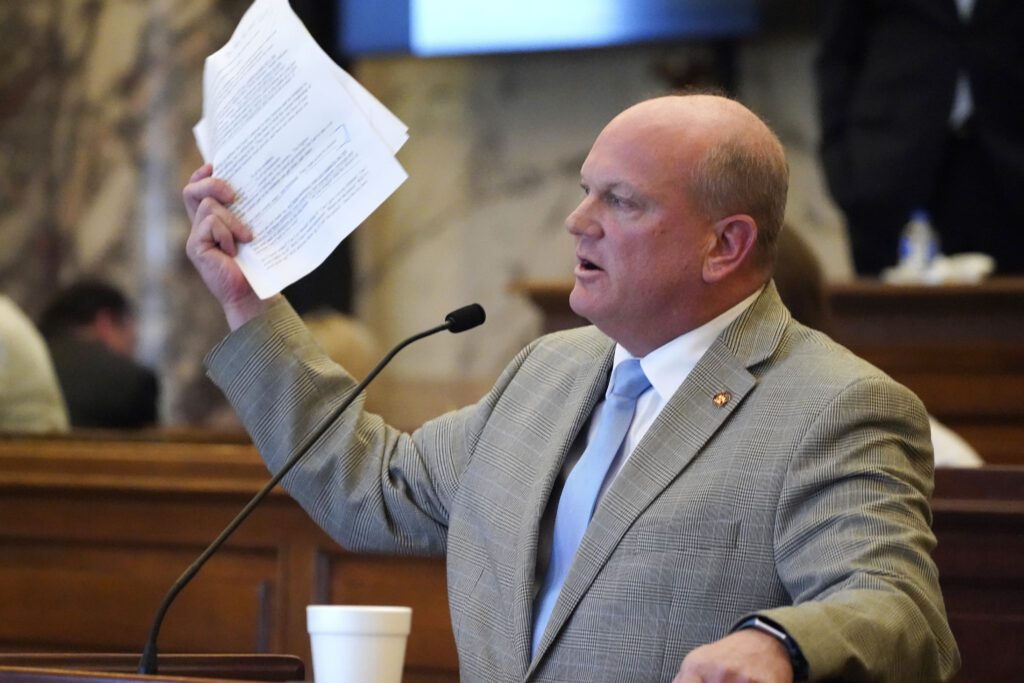
Ways and Means Committee Chairman Trey Lamar, R-Senatobia, (AP Photo/Rogelio V. Solis - Copyright 2023 The Associated Press. All rights reserved.)
The conference report allows the creation of one inferior court with an expiration date, codifies four special temporary judges for Hinds County, and expands Capitol Police jurisdiction by June 2024.
Update March 31:
On Friday, the House of Representatives took up HB 1020 a day after the Senate passed the legislation. Nearly immediately, five points of order were called. Four were offered by Representative Robert Johnson (D) and one by Representative Bryant Clark (D).
House counsel spent several hours determining the validity of those points, and ultimately found that they were not well taken, meaning they could not stop the bill in that way. When it came back before the chamber, Representative Edward Blackmon (D) was the first to speak against the bill.
Blackmon called the creation of an inferior court within the CCID unconstitutional, due to the provision of appointed judges. He also pointed out the area in which the CCID was expanded, is primarily made up of white residents.
“Why are we having appointed judges instead of elected judges,” asked Blackmon.
Representative Chris Bell (D) expressed particular concern with a provision that would require JPD to maintain an appropriately staffed police force.
“How can you maintain those numbers when capitol police are taking officers away from JPD and Hinds County because they can pay more,” asked Bell. He said the believes this policy will actually hurt the city of Jackson.
Bell added that legislation of this nature puts people further apart from each other. He believes if the state approves the bill, which he sees as a Jackson police department take over, it could be another city years from now. Rep. Robert Johnson (D) echoed similar sentiments saying if members came together to work on this, he believes they could find a more reasonable solution.
Johnson said his greatest issue with the bill is that the new inferior court would have the authority to issue misdemeanors.
This charge can sometimes carry a sentence of up to six months. The major hang up for Johnson is the fact that if convicted in this area with a sentence, an individual would be handed over to the custody of the Mississippi Department of Corrections (MDOC). Those sentences would now be served out in prison, instead of a local jail.
“That misdemeanor going to prison thing is just something I don’t think I can go to sleep at night thinking about,” said Rep. Johnson.
Several others spoke on the bill, for nearly 2 hours. Many of which pointed to racial motives for not sending the money directly to Jackson. Others called the move a creation of “police state.”
When Rep. Lamar closed on the bill, he said he refused to take the “race” bate on the legislation.
“I’m doing this for the right reasons in my heart and I can sleep at night. Because I know the only color that should matter is red, and my heart bleeds red too,” said Lamar.
Some who spoke against the bill questioned why the Legislature would not send the money being allotted for capitol police directly to the city of Jackson, and again pointed at disenfranchising intentions. Lamar said the Legislature has authorized over $200 million in new money for the city of Jackson over the last few years for a variety of projects like parking lots, buildings, and museums.
“We’re not going to turn over hundreds of millions of dollars to a city government over the last several years, whose theme is no water, no sewer, no garbage collection, no attempt to collect the necessary fees to operate those systems, no adequate police force and a failure of the Hinds County leadership to support its own courthouse and jail,” said Lamar.
The bill was passed in the House by a vote of 72 to 41.

Original Story:
The Mississippi Senate moved forward on the second conference report for House Bill 1020 late Thursday. The Legislation, which creates the Capitol Complex Improvement District (CCID) court system, has been one of the most discussed bills of the 2023 session.
It was unclear on Thursday if the bill would move forward at all after a sudden adjournment of the House. Prior to bringing the bill up on the floor, State Senator Brice Wiggins (R), who handled the bill in the Senate, said he had expected the House to take it up first.
“We’ve stepped forward trying to help Jackson, for lack of a better word, get off its feet, and we stand here today, and the House has decided they want to go home for the day,” said Wiggins. “Chairman Lamar and I have worked really well on this and it’s a shame if we can’t get there.”
Ultimately, the bill was taken up by the Senate on the floor and passed down party lines by a vote of 31 to 15. It was held on a motion to reconsider by Senator Kevin Blackwell (R).
State Representative Trey Lamar (R) also indicated he expected the conference report to be presented in the House on Friday.
The new conference report makes a few changes to what the original bill and Senate strike-all amendment had proposed. Those changes include a combination of the two chambers’ proposals, with adding appointed judges to the current court system and establishing a court system for the CCID.
Changes to the existing Hinds County Court System are as follows:
- Four temporary special circuit court judges in Hinds County Seventh Circuit Court will be appointed by the Chief Justice to expire in December 2026.
- Three full-time assistant public defenders will be added for the Hinds County.
- Two full-time assistant district attorneys will be added for the Seventh Circuit Court.
- The Hinds District Attorney could appoint one full time criminal investigator in addition to the ones already allowed.
As for the new CCID inferior court, it includes:
- Creation of one new inferior court for the CCID to handle traffic violations, ordinances, disturbance of the peace. The Judge will be appointed by the Chief Justice.
- New boundaries for the CCID.
- Three full-time assistant public defenders for the CCID.
- Two attorneys to serve as prosecutors for CCID appointed by the Attorney General.
- Allow Hinds District Attorney to also prosecute cases within CCID.
- This court system would expire in July of 2027.
The new CCID boundaries would be put in place starting in June 2024. They will extend from the west bank of the Pearl River all the way to Northside Drive and continue to encompass most of Downtown Jackson.
The pushed back date for boundary expansion came at the request of Governor Tate Reeves (R) and Department of Public Safety (DPS) Commissioner Sean Tindell, according to Wiggins. With the increased boundaries, Capitol Police jurisdiction will also increase to meet those new boundaries.
“We are setting them up for success,” said Wiggins, adding that DPS indicated they would need time to fill staffing positions to ensure they could adequately patrol the new CCID boundaries as the primary law enforcement agency.

The push back of the implementation of this extending boundaries also gives lawmakers time to determine if additional funding will be needed during the 2024 session.
There is another bill still alive, SB 2343, that would expand the Capitol Police’s jurisdiction to the majority of the city of Jackson, but the Jackson Police Department will remain the primary police agency.
“Outside of the CCID, Jackson Police Department (JPD) has primary jurisdiction, but Capitol Police have jurisdiction in the whole city but just not primary outside of the CCID,” said Wiggins.
Capitol Police will also be required to wear body cameras at all times as long as funds are available to the Department of Public Safety. DPS will be tasked with creating a 9-1-1 system for the public to access Capitol Police if they are within the CCID boundaries and require a quarterly meeting between JPD, Capitol Police and the Hinds County Sheriff’s Department, which Wiggins said was also a request of citizens.
The bill also increases the amount of sales tax revenue to be deposited in the CCID Project fund to 9 percent. This fund goes to maintaining buildings and infrastructure within that area.
Senator Barbara Blackmon (D) spoke on the bill, accusing it of creating a police state within the capital city of Mississippi. Her argument echoed the original objections seen in the House when the bill was presented, alleging racist motivations for the legislation.
“Those kinds of things, I thought, happened in authoritarian areas, some place like Russia. But now we gonna have it right here in our capital city,” said Blackmon.
She said that if the state was truly concerned about helping the city of Jackson, they could put the money given to the CCID into the city instead.
Senator John Horhn (D), a member of the Jackson Delegation, said this has been the most difficult and disappointing legislative session of his 31-year career, particularly because of the bills directed at his district.
“The state government has basically left Jackson to its own devices,” said Horhn. “We take as much resource as we can out and then we blame Jackson.”
Horhn said he does believe that at some point they are going to lift up the capital city and do so in a way with “everyone at the table.” He said he is tired of not being asked to sit at the table and discuss the issues to find solutions.
“Mississippi, one day we are going to fix that,” said Senator Horhn. “How do we figure out how to come together is what I want to know?”
While Horhn said he believes his colleagues in the Senate do truly want to help Jackson, he does not believe proposals like HB1020 are the way to do it. He does not support for the bill in its current form.
The final member of the Jackson Delegation to speak on the bill was Senator David Blount (D). He said in his 16 years in the Legislature, he has never had constituents ask him more about a piece of legislation than this one.
“Everyone in Jackson knows what House Bill 1020 is,” said Blount.
He said efforts to improve Jackson’s crime issues were made last year, but believes this bill was a step back from that.
Senator Blount took issue with the fact that the new appointed positions, including the judges, were not required to live in Jackson. He said the bill is not fundamentally sound because it would divide the city and provide separate representation by people who are not elected. This includes the 9-1-1 provision that would create a separate emergency line for residents within the CCID area.
“We could figure out a 9-1-1 system, if you’d sit down and talk to us. But there’s no incentive to come together and solve these problems. It’s just handed down to the folks who live here,” said Blount.
Blount pointed out that the original passage of the CCID language in 2016 was intended to be a road and infrastructure bill to support buildings and areas utilized by the state for government work. He said that while Jackson is not perfect, and has its problems, they won’t be solved unless they are done by working together.
Senator Wiggins closed on the bill prior to a vote, saying that often the image visitors to the city of Jackson take home with them is one of fear. He said his own guests who have stayed in Jackson shared they were fearful to walk from their hotel downtown to the Capitol building because of crime.
“Is that the image that we want people going back to their state and talking about our Capitol with? No,” said Wiggins.
Senator Wiggins said this issue is not about race but helping the citizens of Jackson in a time of need. Wiggins pointed out the support shown to the cities devastated by the recent tornado that went through Rolling Fork, Silver City, Amory and others.
“People are tired, scared, angry, and frustrated. They want action by elected officials,” Wiggins read from a letter by a constituent.
Wiggins noted that the bill contains elements that many who are speaking against it, actually pushed for. He asked members to set aside politics and vote for what is right.
Original House Version
In the original House bill, two new inferior court systems would have been created with appointed judges, along with two additional prosecuting attorneys and State Defenders. The courts would have had the authority to hear criminal and civil cases.
The House version would have also expanded the limits of the Capitol Complex Improvement District all the way to County Line Road at Ridgeland. These new boundaries would in turn expand the jurisdiction of the Capitol Police and require body cameras on all officers.
This new CCID area would have still include much of downtown Jackson and added the Belhaven and Fondren business and residential areas. Within the residential area, the majority of Jackson’s white population live in this area, causing claims of racial inequity when the bill was introduced on the House floor.
Members of the Hinds County delegation alleged racist intentions behind the bill and a disenfranchisement of black residents in the city.
“You cannot come into a community and try to change it without having input from the community,” said State Representative Chris Bell (D) at the time. “Since I’ve been here, it’s been an issue with not understanding the values we have in the City of Jackson. We are not incompetent, our judges are not incompetent, our mayor’s not incompetent.”
Original Senate Changes
When the bill made it to the Senate, major changes were made. Instead of establishing a new court system that would not have been governed by Hinds County, the Senate offered to add additional temporary special judges appointed by the Chief Justice to the current court system. The Legislature is already funding three of those temporary judges in an attempt to help clear up the backlog.
The Senate version would have also provided for three additional Assistant District Attorneys, three Assistant Public Defenders and a second Assistant County Prosecutor that would have been permanent.
The Senate strike-all amendment removed all CCID language and chose not to handle any jurisdiction expansion for the Capitol Police. There is another bill still alive that would address that.
The Jackson delegation did indicate that they saw improvement in the Senate version but many still pointed to the lack of resources within the State Crime Lab as the real reason for backlog in court cases. They also asked for residency requirements for those appointed judges and others.











